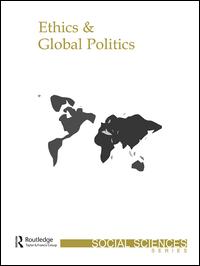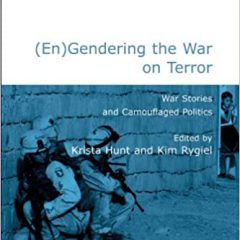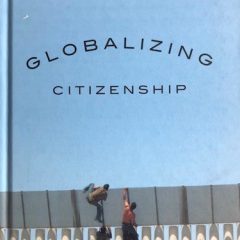Rygiel, K Mobile Citizens, Risky Subjects: Security Knowledge at the Border, in: S. Ilcan (ed.), Mobilities, Knowledge and Social Justice, McGill-Queen’s University Press, 2013, pp. 152-177.
Throughout major airports across the United States, Canada, and countries in Europe, plans are under way for installing full-body scanners in response to the failed attempt by Umar Farouk Abdulmutallab to blow up an airplane travelling from Amsterdam to Detroit on Christmas Day 2009. Despite concerns from privacy groups and security experts that scanners will not enhance security, these nations are investing in this latest technological border control (Stone 2009). Canada will pay as much as $11 million for 44 scanners (Maccharles 2010a), while some forty scanners have already gone into 19 U.S. airports, with plans to increase the number…
The mobility of people, objects, information, ideas, services, and capital has reached levels unprecedented in human history. Such forms of mobility are manifested in continued advances in communication and transportation capacities, in the growing use of digital and biometric technologies, in the movements of Indigenous, migrant, and women’s groups, and in the expansion of global capitalism into remote parts of the world. Mobilities, Knowledge, and Social Justice demonstrates how knowledge is mobilized and how people shape, and are shaped by, matters of mobility. Richly detailed and illuminating essays reveal the ways in which issues of mobility are at the centre of debates, ranging from practices of belonging to war and border security measures, from gender, race, and class matters to governance and international trade, and from citizenship and immigration policies to human rights. Contributors analyze how particular forms of mobility generate specific types of knowledge and give rise to claims for social justice. This collection reconsiders mobility as a key term in the social sciences and humanities by delineating new ways of understanding how mobility informs and shapes lives as well as social, cultural, and political relations within, across, and beyond states.
Table of Contents
Part One: Frames of Belonging
1 Contending Frames of ‘Security’ and ‘Citizenship’: Lebanese Dual Nationals during the 2006 Lebanon War 25
Daiva Stasiulis
2 Knowledge, Gender, and Changing Mobility Regimes: Women Migrants in Europe 59
Eleonore Kofman and Parvati Raghuram
3 Mundane Cosmopolitanism, Mobility, and Social Justice: A Neo- Durkheimian Approach 76
Ronjon Paul Datta
4 Integrating High-Tech Immigrants and Temporary Workers in Canada’s New Economy: Structural Limitations to Mobilities 103
Lloyd Wong and Karl Froschauer
Part Two: Governance and Expertise
5 Mobility Regimes: The Short Life and Times of North America’s Security and Prosperity Partnership 131
Janine Brodie
6 Mobile Citizens, Risky Subjects: Security Knowledge at the Border 152
Kim Rygiel
7 Paradoxes of Humanitarian Aid: Mobile Populations, Biopolitical Knowledge, and Acts of Social Justice in Osire Refugee Camp 177
Suzan Ilcan
8 Payday Loans: Assembling the Immobile Subject of Fringe Credit 207
Rob Aitken
9 Geographical Indications, Mobility, and Identity 227
Daniel Gorman
Part Three: Counter-Movements
10 Justice for Migrants: Mobilizing a Rights-Based Understanding of Migration 255
Tanya Basok and Nicola Piper
11 Critical Mass, Global Mobilities, and the Haudenosaunee: Struggles for Cultural Autonomy 277
William D. Coleman and Theresa McCarthy
12 International Copyright Law, Access to Knowledge, and Social Justice 300
Myra Tawfik
13 ICTs as a Catalyst for Social Justice? A Capabilities Perspective 320
Daniel J. Paré and Sandra Smeltzer
14 Mobilizing for Development: Promises, Perils, and Policy Implications of M4D 340
Leslie Regan Shade
15 Symbolic Knowledge Mobilities and Biopolitical Governmentalities of Resistance of Solomon Islands’ Pipol Fastaem 361
Anita Lacey
16 Mobility, Human Rights Activism, and International Intervention in Darfur 377
Amanda Grzyb


